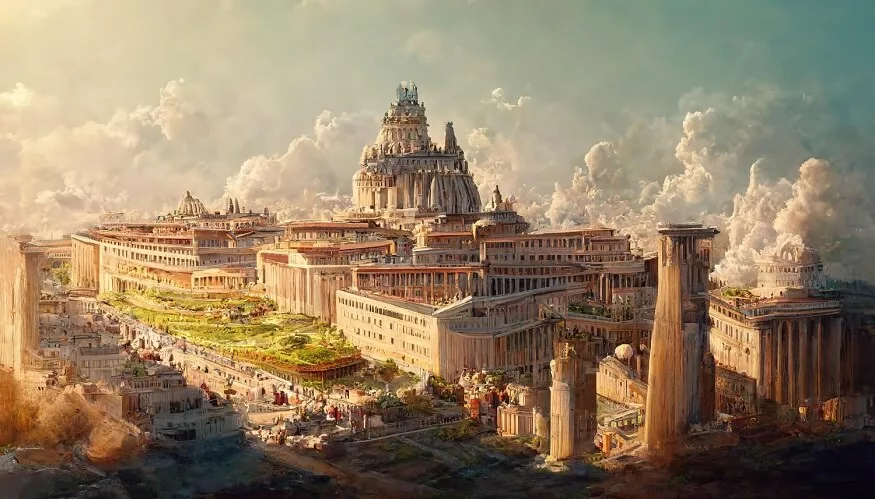From technology to governance, law, architecture, agriculture, astronomy, and language, ancient Civilisations have had a huge influence on the way society functions today.
In this blog, we discuss seven groundbreaking ancient Civilisations and how they continue to influence contemporary society.
Also Read: Why is it Important to Study Ancient Civilisation – Benefits
- The Ancient Egyptians (3100-332 BCE)
- The Ancient Greeks (800-600 BCE)
- The Mayans (2000 BCE–1697 CE)
- The Roman Empire (753 BC–476 AD)
- The Chinese Dynasties (c. 2100–1912 AD)
- Mesopotamia (3500–539 BCE)
- Indus Valley Civilisation (3300–1300 BCE)
The Egyptians introduced the world to stone architecture and the arch. The Great Pyramids of Giza, the world’s oldest stone buildings, remain an architectural marvel and inspiration even today. Their advanced knowledge in construction is adopted in today’s building engineering, making them even more relevant in this day and age.
The ancient Egyptians also pioneered the foundation of mathematics and geometry. They developed a decimal system, applied fractions, and used rudimentary arithmetic and geometry principles to calculate areas and volumes relevant to construction projects and tax collection. Today, their ancient mathematical concepts continue to be an intrinsic part of our contemporary mathematical calculations.
The Ancient Egyptian civilisation was also ahead of its time in terms of medical knowledge. They diagnosed and treated diseases with unprecedented sophistication in the ancient world. Many of the remedies and surgical techniques they developed are still applied in modern medicine. Notably, they were the first to use stitches to close wounds.
The antiquated society also demonstrated its ingenuity through the creation of a calendar. The Egyptians’ system, designed to predict the annual flooding of the Nile, consisted of 12 months with 30 days each, along with five additional festival days. This 365-day calendar remarkably mirrors our Gregorian calendar.
Also Read: The Bronze Age Era and its Empire
One of the key Greek legacies influencing the present world is politics. The concept of democracy originated from the city-state of Athens in the 5th century BC. Democracy has become a cornerstone for most modern governments today. It provides a platform for majority rule, citizen participation, and equality before the law, principles that are central to the political systems of today’s free societies.
In philosophy, Plato and Aristotle, have been the most influential Greek philosophers, who have given the world theories and principles that are still referenced in contemporary philosophical discussions. Aristotle’s ‘Golden Mean’ principle, for example, suggests that moral behaviour lies between extremes. This principle continues to be quoted in modern ethical theories.
Their scientific and mathematical achievements continue to significantly influence the way we perceive the current-day metaphysical world. Pioneers like Pythagoras, Euclid, and Archimedes are responsible for laying down the fundamental principles in mathematics and geometry that are still taught in today’s classrooms.
The contributions of Hippocrates are significant, as one whose name and oath continue to resonate in the medical profession.
The Greek civilisation’s influence on the arts has opened the ground for the development of different genres in literature and drama. The Greek architectural style, including the famous Doric, Ionic, and Corinthian orders, continues to grace modern structures, while Greek mythologies remain a rich source of material for movies, books, and video games.
The Maya civilisation boasted remarkable advancements in astronomy, mathematics, and writing systems. The Mayan calendar was one of the most sophisticated counting systems of ancient times.
The Mayans’ detailed understanding of astronomical phenomena considerably matches present-day knowledge. Their hieroglyphic system of writing has become the basis for several modern deciphering tools.
The idea of a senate comes from the Latin word ‘senatus’ and was initially established by the Romans. It greatly influenced how governments are structured, particularly in the US The modern law still uses elements of the ancient Roman law.
Roman law first introduced the principle of ‘innocent until proven guilty’. Their architectural prowess, using arches, domes, and concrete, still influences modern structures. Additionally, over half of the English language has roots in Latin. Even today, Latin is used extensively in the legal and medical professions.
Last but not least, some sporting events, such as the Olympics, were influenced by Roman games.
Also Read: What is a pyramid: History of egyptian pyramid and construction
China’s ancient Civilisations , particularly the Han and Tang Dynasties, nurtured significant achievements like the invention of papermaking, compass, gunpowder, and printing techniques like block and movable type, collectively referred to as the “Four Great Inventions.”
These innovations have revolutionised human communication and navigation, respectively even to this day.
Recognised as the “Cradle of Civilisation,” Mesopotamia is home to essential innovations like the first law code by Hammurabi, the invention of the wheel, and the development of the cuneiform script— one of the earliest known systems of writing.
These advancements have been extended for use in the modern legal system, transportation technology, and information recording methods.
This Indus Valley Civilisation was advanced in its systems of urban planning, architecture, and technology. They created a sophisticated system of urban planning featuring grid-based cities, advanced drainage systems, and standardised weights and measures.
The script used by this civilisation, though not completely deciphered, is regarded as one of the earliest forms of written language.
The influences of this civilisation can be seen today in the urban design of modern cities. The utilisation of a grid-based city layout system is a direct legacy of the Indus Valley Civilisation.
The ancient Civilisations greatly impacted modern society through their inventions, philosophies, and ideas. Their legacy of knowledge and wisdom has transcended generations, shaping our lives in various ways.
Also Read: How key rivers like the Nile and Indus contributed to the development of ancient societies
At EuroSchool, we provide students with a holistic and enriching educational experience of history to develop a deeper understanding and appreciation of these ancient civilisations for their extraordinary contributions in shaping future generations.











